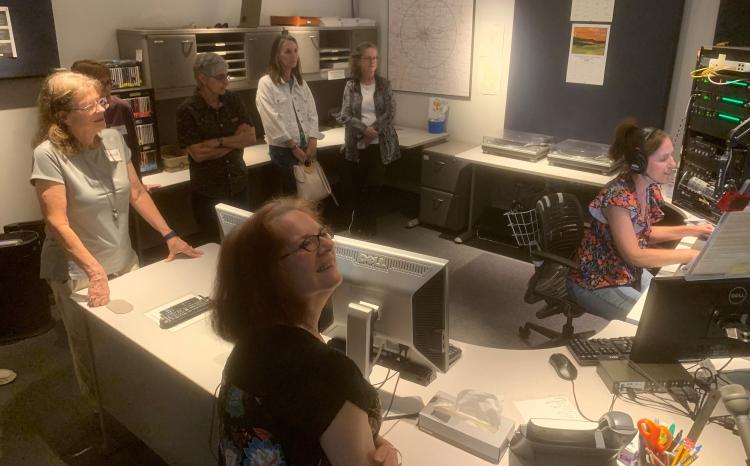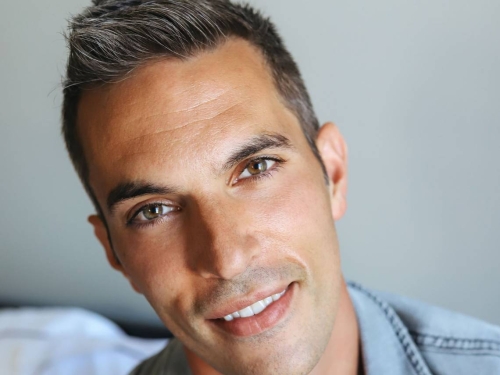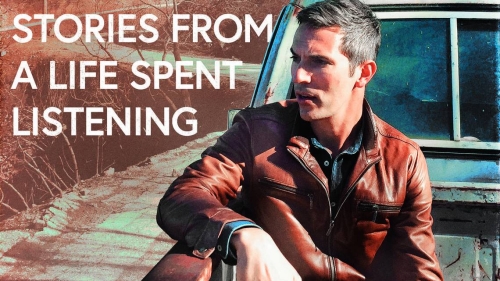
This story first appeared in The Kansas City Star on June 9, 2024.
Ten Kansas Citians recently gathered at KCUR (89.3) for the FYI Book Club discussion of Ari Shapiro’s book, The Best Strangers in the World ahead of his appearance this week in Kansas City.
But before the conversation, the group toured the station, getting a peek at the kind of environment Shapiro and his “All Things Considered” co-hosts might work in.
KCUR Program Director Ron Jones walked from studio to studio. In one, he explained where Up To Date guests sit, how they’re instructed to use the cough button, and the slight broadcast delay that helps the host comply with Federal Communications Commission laws concerning profanities.

In another, the group found afternoon announcer Laurie Arbore mid-shift. Between segments, she talked about how she keeps an eye on the clock so that she won’t miss her next announcement, carefully scheduling every move she makes throughout her workday.
But, over her 29 years in radio, Arbore said “reading is the most valuable skill I have for this job.”
Though Arbore commented in the context of reading aloud on air, Shapiro echoes a similar sentiment in his book about the importance of reading to his own career.
Kaite Stover, FYI Book Club organizer and the Library’s director of readers’ services, asked how being a good reader makes someone a good storyteller.
“Shapiro is talking about the power of fiction and reading and how it makes you question what’s going on in the world,” Stover said.
Vicki Meek of Leawood jumped in with a quotation from Shapiro’s book. Venezuelan journalist Karina Sainz Borgo once told Shapiro, “‘Journalism and nonfiction provide us answers, but I think fiction provides us questions.’ And that is one of the statements that I keep mulling over,” Meek said.
Stover said she reads nonfiction for ideas and information, but she reads fiction because “I want to know, what is someone feeling. … So, for me, it’s never more questions, unless the question is: How would I have reacted in that situation?”
Shapiro wrote: “In this time of mutual mistrust and tribalism, we have few incentives to reach across divides. And then, we pick up a book and see the world through someone else’s eyes.”
It’s those questions he’s willing to ask, and his willingness and ability to see through another’s eyes that the group focused on as a mark of curiosity — which they said makes a good storyteller.
“He’s curious, and he looks like he’s always striving to make some sort of connection,” said Susan Jackson, who lives in midtown.

Before becoming a co-host of All Things Considered, Shapiro spent five years as NPR’s justice correspondent during the George W. Bush administration and four years as the White House correspondent while Barack Obama was in office. He traveled extensively, covering conflicts and unrest all over the world.
“A war is pretty hard to grasp,” said Virginia Brackett, a writer and Park University professor emeritus who has developed writing workshops for veterans, “but if you hear the story of an individual, you can really lock in on that. … We don’t have to have been in that exact situation, but we need a face — or voice, as it turns out, with the radio.”
In 2015, Shapiro was NPR’s London correspondent, and was called on to cover the Syrian refugee crisis. In Izmir, Turkey, he met a man offering his restaurant’s restrooms, electricity and Wi-Fi to weary migrants.
“I was looking for a way to break through the background noise,” Shapiro wrote in the book. “To help people in the U.S. see these Syrians as three-dimensional humans, not just some faceless mass. And what could be more relatable than looking for a Wi-Fi hotspot or a place to charge your phone?”
Brackett said she imagined that if people heard on the radio that “we’re going to talk about the Syrian refugee crisis today, they might not pay attention to it. But the way he gets our attention, again, by helping us identify with the people he’s describing … that’s a good storyteller.”
Ruth Cain, who lives in Overland Park, said that the part about the refugees was one of her favorites.
Shapiro continued to look for a way to “cut through the noise,” and decided to find one person whose journey he could tell start to finish — with the help of colleagues in other parts of Europe.
“It wasn’t just a one-off story, you know, before we move on to something else,” Cain said, “but you’ll be interested in following those individuals and where they ended up. And I think that shows us compassion. … That was a side of journalism I hadn’t thought of.”
Shapiro found 33-year-old Monzer Omar, whose wife and two daughters, plus one on the way, stayed behind in Syria, while he looked for passage from Turkey to a welcoming European country where he could establish a new life before sending for them.
It took about two years, but Omar was reunited with his wife and children at their new home in Germany, and people all over the world felt invested in their journey, taking to social media with stories about crying tears of joy onto their breakfast or in their cars on the way to work.

Jackson, the participant from midtown, said she’s not normally a fan of memoirs. But she found it striking that the “strangers” Shapiro wrote about and made people feel connected to, were often, like Omar, not “the rich and powerful. … He was talking about ordinary people and their ordinary struggles. I thought it was very humbling to read that.”
When Stover asked the group to move from what makes a good storyteller to what makes a good story, several people spoke up.
Brackett said a good story allows a reader to hear about events straight from the source’s mouth – not a narrative simply filtered through a journalist or some other kind of storyteller.
Cain wanted to be emotionally and intellectually drawn in by the language itself.
But Judy Ellett of Waldo suggested that a distinguishing feature of a really good story isn’t necessarily immediate.
She said, “If it’s something you keep thinking about long after you’ve read it. … That’s a good story.”
MEET THE AUTHOR Ari Shapiro will appear at 7 p.m. June 13, 2024, at the Kansas City Public Library, 14 W. 10th St., as part of the library’s 150th anniversary celebration. The public reception begins at 6 p.m. RSVP at kclibrary.org/events. The main event hall is at capacity, but some overflow seating is still available.
JOIN THE CLUB The Kansas City Star and the Library present a book-of-the-moment selection every few months and invite the community to read along. To participate in the next discussion led by Kaite Stover, the library’s director of readers’ services, email kaitestover@kclibrary.org.